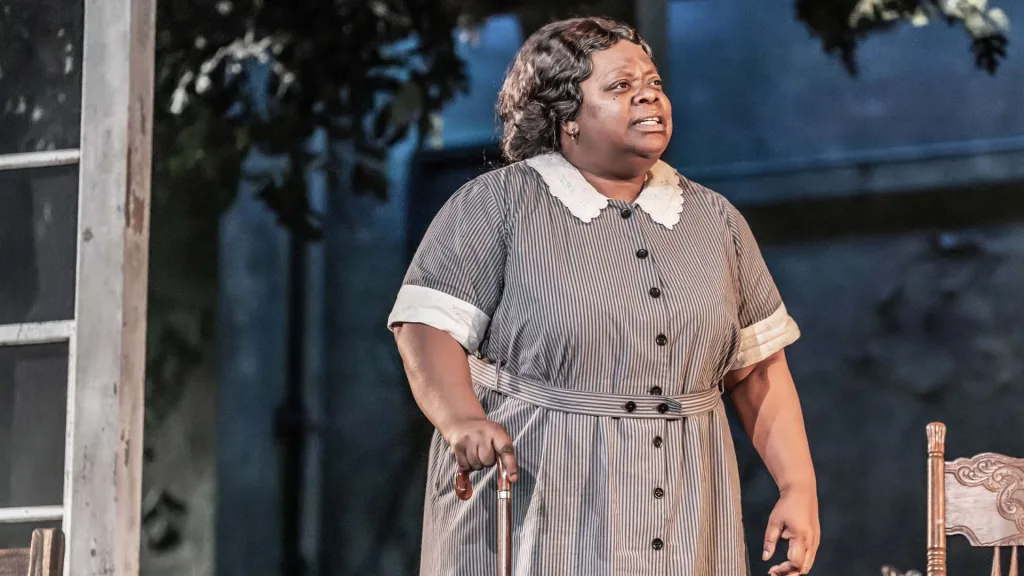Calpurnia, also affectionately known as Cal, is a prominent character in Harper Lee’s classic novel, To Kill a Mockingbird. As the Finch family’s black housekeeper, Calpurnia plays a vital role in the lives of Scout and Jem Finch, the main protagonists of the story. Her character is depicted as a woman of immense intelligence, efficiency, and unwavering devotion to the Finch family’s interests.
Having served as the cook for the Finch family since Jem’s birth, Calpurnia is a familiar and trusted figure in the Finch household. Scout, the young narrator of the story, describes Calpurnia as a woman with a lean figure, angular features, and nearsighted eyes. However, it is her wide, hard hand that leaves a lasting impression on Scout, as Calpurnia is not hesitant to discipline the young girl when necessary.
Despite her strictness, Calpurnia’s role in the Finch household extends far beyond that of a mere housekeeper. She serves as a surrogate mother figure to Scout and Jem, providing them with love, care, and guidance. Calpurnia’s influence on Scout is particularly significant, as she helps shape the young girl’s understanding of the world and teaches her important life lessons.
As Scout grows older and starts attending school, her perception of Calpurnia begins to change. Initially viewing her as tyrannical and meddlesome, Scout later comes to appreciate Calpurnia’s intentions and actions. The bond between them grows stronger, and Scout recognizes Calpurnia’s unwavering loyalty and commitment to the Finch family.
One aspect of Calpurnia’s character that stands out is her fascination with trying to foretell the future. Despite her practical nature, Calpurnia possesses an incongruous interest in superstitions and divination. This adds depth to her character and showcases her multifaceted personality.
Calpurnia’s role as a black woman in a racially divided society is also significant. She navigates the complexities of racism and discrimination with grace and resilience. Her presence in the Finch household challenges the prevailing racial prejudices of the time and serves as a reminder of the inequality and injustice faced by African Americans.
Calpurnia is a pivotal character in To Kill a Mockingbird, playing a crucial role in the lives of the Finch family, particularly Scout and Jem. She is depicted as a woman of intelligence, efficiency, and unwavering dedication to the Finch family’s well-being. Calpurnia’s evolving relationship with Scout highlights the growth and maturity of both characters. Her fascination with the future and her ability to navigate the racial tensions of the time further contribute to her complexity as a character. Calpurnia’s presence in the novel serves as a reminder of the societal challenges faced by African Americans during that era.
What Was Calpurnia Known For?
Calpurnia, wife of Julius Caesar, was known for several notable qualities and characteristics. First and foremost, she was renowned for her formidable intelligence and efficiency. Calpurnia was a woman of great intellect, possessing sharp wit and astute decision-making skills. Her ability to analyze situations and provide insightful counsel made her a trusted advisor to her husband.
Furthermore, Calpurnia was utterly devoted to Julius Caesar’s interests. She dedicated herself wholeheartedly to supporting and furthering his ambitions and goals. Calpurnia’s unwavering loyalty and commitment to her husband were widely acknowledged and respected.
However, one intriguing aspect of Calpurnia’s character was her incongruous fascination with trying to foretell the future. She had a deep interest in divination and sought to interpret omens and signs to gain insights into what lay ahead. This interest in predicting the future added a unique dimension to her personality, highlighting her curiosity and desire for knowledge beyond the present.
Calpurnia was known for her formidable intelligence, efficiency, and unwavering devotion to Julius Caesar. Her fascination with divination and attempts to foresee the future added a distinct aspect to her character, showcasing her inquisitive nature.

Who Is Calpurnia To Scout And Jem?
Calpurnia, also known as Cal, holds a significant role in the lives of Scout and Jem, who are the children of the Finch family. She has been the family’s trusted black housekeeper for a long time and has been involved in their upbringing since they were infants. Calpurnia’s relationship with Scout and Jem is that of a caretaker and a trusted companion.
With her strong and commanding personality, Calpurnia takes her role as a caretaker seriously. She is not afraid to discipline Scout and Jem when necessary, often using the palm of her hand to administer justice. Calpurnia ensures that the children learn important life lessons and grow up with a sense of responsibility and respect.
Throughout Scout and Jem’s lives, Calpurnia has been a constant presence and a source of guidance. She has not only looked after their physical needs but also imparted valuable wisdom and knowledge. Calpurnia acts as a bridge between the Finch family and the African American community, helping the children understand the racial dynamics of their town and encouraging them to empathize with others.
Aside from her role as a caretaker, Calpurnia is also a maternal figure to Scout and Jem. She provides them with love, support, and a sense of stability in their lives. Despite being from a different racial background, Calpurnia treats the children as her own and ensures their well-being.
Calpurnia is not just a housekeeper to Scout and Jem but an integral part of their lives. She serves as a caretaker, disciplinarian, mentor, and maternal figure. Through her guidance and presence, Calpurnia plays a crucial role in shaping the values and character of Scout and Jem as they navigate the complexities of life in their small town.
Who Is Calpurnia How Does Scout Describe Her?
Calpurnia is a crucial member of the Finch family household, serving as their cook for as long as Jem, Scout’s older brother, can remember. Scout vividly describes her physical appearance, portraying Calpurnia as a woman with a lean figure, characterized by sharp angles and prominent bones. Scout also notes that Calpurnia is nearsighted, suggesting a possible need for corrective lenses. Additionally, Calpurnia possesses a wide and firm hand, which she occasionally uses to discipline Scout when necessary.
Scout’s description of Calpurnia highlights her lean physique, nearsightedness, and her disciplinary approach towards Scout.
How Does Scout View Calpurnia?
Scout’s view of Calpurnia undergoes a transformation as she grows up. Initially, Scout sees Calpurnia as a figure of authority who exercises a kind of “tyranny” over her. Scout perceives Calpurnia’s actions as unfair and intrusive, often meddling in her personal affairs. However, as Scout goes to school and gains more life experiences, her attitude towards Calpurnia starts to change.
Scout begins to appreciate Calpurnia’s presence and the value she adds to their household. She starts to understand that Calpurnia’s actions are driven by her genuine care and concern for Scout’s well-being. Although Scout may not always agree with Calpurnia’s decisions or methods, she recognizes that Calpurnia’s intentions are ultimately rooted in love and protection.
As Scout matures, she develops a deeper respect for Calpurnia’s wisdom and guidance. She realizes that Calpurnia has played a significant role in shaping her character and teaching her important life lessons. Scout no longer perceives Calpurnia’s actions as mere “meddling” but as a form of guidance and support.
Scout’s attitude towards Calpurnia shifts from viewing her as a strict and oppressive authority figure to appreciating her as a valued member of their family. She acknowledges Calpurnia’s role as a caregiver, acknowledging her dedication and the positive impact she has had on her life.
Scout’s evolving perspective on Calpurnia reflects her growth and development as a character. She learns to value and respect Calpurnia’s presence, recognizing her as an important mentor and guide in her life.

Conclusion
Calpurnia is a central figure in Harper Lee’s novel To Kill a Mockingbird. She is not just a housekeeper but a caretaker, mentor, and disciplinarian to the Finch children, Scout and Jem. Calpurnia’s role in the Finch family goes beyond cooking and cleaning; she instills important values and life lessons in the children, teaching them about empathy, respect, and racial equality.
Calpurnia is portrayed as a woman of great intelligence and efficiency, always dedicated to the best interests of the Finch family. She is respected and valued by Atticus Finch, Scout and Jem’s father, who entrusts her with the responsibility of raising his children. Despite being a black woman in a segregated society, Calpurnia manages to navigate her role with grace and strength, serving as a moral compass for Scout and Jem.
While initially seen as strict and authoritarian, Scout’s perception of Calpurnia evolves as she grows older. Scout begins to appreciate Calpurnia’s guidance and the tough love she provides. Calpurnia’s discipline, although sometimes harsh, is a reflection of her deep care for the children’s well-being and her commitment to teaching them important life lessons.
Furthermore, Calpurnia’s character challenges the racial prejudices prevalent in Maycomb, the fictional town in which the story is set. As a black woman working for a white family, she faces the harsh realities of racial discrimination on a daily basis. However, Calpurnia’s strength and resilience shine through, as she maintains her integrity and dignity in the face of adversity.
In essence, Calpurnia is a complex character who plays a significant role in shaping the moral development of Scout and Jem. She represents the importance of empathy, fairness, and equality in a society plagued by racial tensions. Through her unwavering dedication and wisdom, Calpurnia serves as a beacon of hope and inspiration in the turbulent times of the novel.
